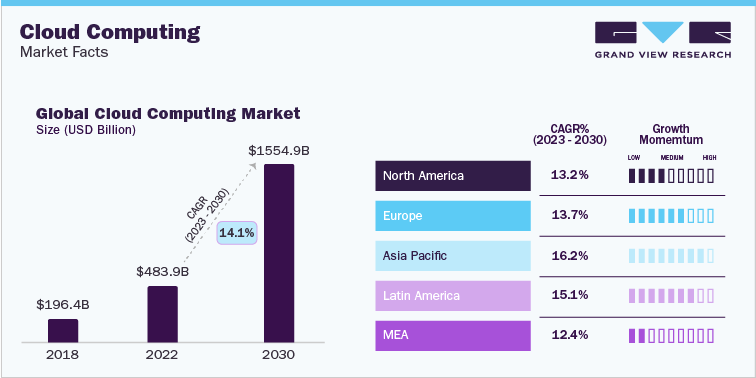
Global cloud computing industry database is a collection of market sizing information & forecasts, competitive benchmarking analyses, macro-environmental analyses, and regulatory & technological framework studies. Within the purview of the database, all such information is systematically analyzed and provided in the form of presentations and detailed outlook reports on individual areas of research.
Private Cloud Market Analysis & Forecast
The global private cloud market was valued at USD 222.30 billion in 2022 and is expected to grow at a CAGR of 14.7% over the forecast period from 2023 to 2030. Enterprises are increasingly adopting private cloud infrastructure due to the high volume of sensitive data they produce. Companies can better understand customer behavior and create new goods and services by analyzing patterns in real-time data. Hence, enterprises are continuously adopting private cloud infrastructure.
Vendors are continuously adopting various growth strategies to increase their presence in the market. For instance, in March 2022, Adobe announced the development of the ecosystem with new partners and tools. Through the launch of Adobe Experience Cloud, its private cloud network, the company started offering developers new tools for creating and deploying cloud-based apps that integrate seamlessly across its products. The extensive ecosystem of tech partners for Adobe includes FedEx, Anaplan, OneTrust, Walmart, PayPal, and The Weather Company, an IBM Business.
Access the Global Cloud Computing Industry Data Book from 2023 to 2030, compiled with details by Grand View Research
Public Cloud Market Analysis & Forecast
The global public cloud market size was valued at USD 171.39 billion in 2022 and is expected to expand at a compound annual growth rate (CAGR) of 13.1% from 2023 to 2030. Owing to the high scalability and reduced operational costs offered by cloud services in the wake of digital transformation of industries, the market is witnessing rapid growth. Moreover, enterprises across the globe are gradually adopting public cloud technology to rapidly build, test, and release quality software products.
The public cloud is a multi-tenant environment, which offers rapid elasticity and high scalability with capability to consume resources on a pay-per-use basis. Governments and institutions are planning gradually to completely integrate its conventional systems with these computing technologies. As a part of the IT Modernization effort, U.S Federal Government had initiated Cloud Smart Strategy in October 2018 to improve citizen-centric services, accessibility, and maintain cybersecurity. Moreover, adoption of the technology is rapidly gaining importance among Small and Medium Enterprise (SMEs) sector due to the cost competitiveness offered in the market.
Currently, most of the enterprises of varying sizes, are revamping from traditional to digital mode of business. The transformation is likely to create potential market for public cloud owing to its benefits such as reduced Total Cost of Ownership (TCO), agility, and flexibility. IBM Corporation states that around 89% of IT professionals expect to move business-critical workloads to cloud, which are driven by the growth in digitization.
Government organizations are also this technology services for storage, disaster recovery, risk compliance management, and identity access management applications. In October 2019, amidst corporate hostility, Microsoft Corporation was awarded the U.S Department of Defense contract, Joint Enterprise Defense Infrastructure (JEDI) worth USD 10 billion.
Hybrid Cloud Market Analysis & Forecast
The global hybrid cloud market size was valued at USD 90.28 billion in 2022 and is projected to grow at a compound annual growth rate (CAGR) of 14.2% from 2023 to 2030. Hybrid cloud solutions offer enterprises a competitive edge by enabling scalability, advanced services, and secure infrastructure. This strategy provides a secure firewall for private services and sufficient integration. In addition, it offers several benefits, such as total support for the remote workforce, decreased operational costs, and improved scalability, control, security, and risk management. Hence, the extensive use of cloud computing services is expected to boost demand for hybrid cloud solutions over the forecast period.
A decline in traditional DCO is due to the increase in infrastructure utility services, colocation, and hosting spending. This is anticipated to fuel the transition to cloud hosting. Moreover, government agencies are refocusing their efforts on implementing hyper-scale clouds, which offer advantages including unified operations, data center modernization, application innovation, and security and governance. Furthermore, the cloud allows government organizations to handle cyclical demands or emergencies without overprovisioning hardware.
Order Free Sample Copy of “Cloud Computing Industry Data Book - Public Cloud, Private Cloud and Hybrid Cloud Market Size, Share, Trends Analysis, And Segment Forecasts, 2023 - 2030” Data Book, published by Grand View Research
Key players operating in the cloud computing industry are –
• Alibaba Group Holding Ltd.
• Amazon.com Inc.
• Adobe Inc.
• Google LLC
• Microsoft Corp.
• International Business Machines Corp
• Oracle Corp.
• Salesforce.com Inc.
• SAP SE
• Workday, Inc